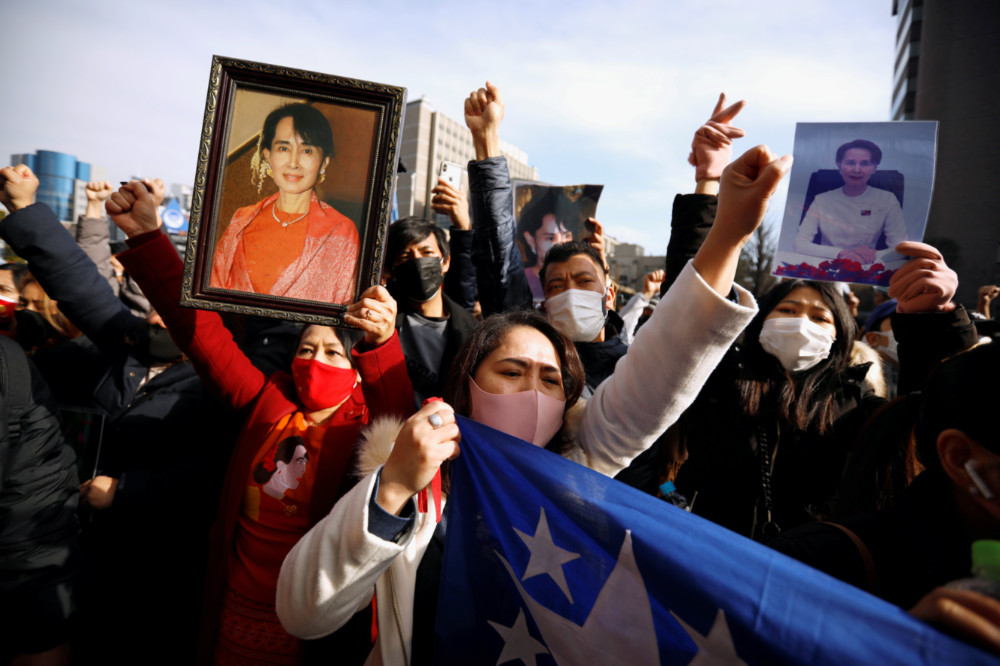The United States threatened to reimpose sanctions on Myanmar’s generals after they seized power in a coup and detained elected leader Aung San Suu Kyi, whose whereabouts remained unknown on Tuesday more than 24 hours after her arrest.
The UN Security Council was due to meet later on Tuesday, diplomats said, amid calls for a strong global response to the military’s arrest of the Noble Peace laureate and dozens of her political allies on dawn raids on Monday.

Myanmar’s military checkpoint is seen on the way to the congress compound in Naypyitaw, Myanmar, on 1st February. PICTURE: Reuters/Stringer
The coup followed a landslide win for Suu Kyi’s National League for Democracy (NLD) party in November elections, a result the military has refused to accept citing allegations of fraud.
The army handed power to General Min Aung Hlaing and imposed a state of emergency for a year, crushing hopes the poverty-stricken country also known as Burma was on the path to stable democracy after decades of military meddling in politics.
US President Joe Biden said the coup was a direct assault on Myanmar’s transition to democracy and the rule of law, and said his administration would be watching how other countries responded.
“The United States removed sanctions on Burma over the past decade based on progress toward democracy. The reversal of that progress will necessitate an immediate review of our sanction laws and authorities, followed by appropriate action,” Biden said in a statement.
“We will work with our partners throughout the region and the world to support the restoration of democracy and the rule of law, as well as to hold accountable those responsible for overturning Burma’s democratic transition,” he said.
The crisis in Myanmar is one of the first major tests of Biden’s pledge to collaborate more with allies on international challenges, especially on China’s rising influence. That stance contrasts with former President Donald Trump’s often go-it-alone ‘America First’ approach.
The United Nations led condemnation of the coup and calls for the release of detainees and restoration of democracy in comments largely echoed by Australia, the European Union, India, Japan and the United States.
China did not join the condemnation, saying only that it noted the events and calling on all sides to respect the constitution. Other countries in the region including neighbouring Thailand refused to comment on Myanmar’s “internal affairs”.
The streets of Myanmar were quiet overnight during a curfew already in place to stop the spread of coronavirus. Troops and riot police took up positions in the capital, Naypyitaw, and the main commercial centre Yangon.

Myanmar protesters residing in Japan hold photos of Aung San Suu Kyi as they rally against Myanmar’s military after seizing power from a democratically elected civilian government and arresting its leader Aung San Suu Kyi, at United Nations University in Tokyo, Japan, on 1st February. PICTURE: Reuters/Issei Kato
By Tuesday morning, phone and internet connections were running again but usually bustling market places were quiet and the airport in the commercial hub of Yangon was closed.
Banks said they would reopen on Tuesday after suspending services on Monday amid a rush to withdraw cash.
Suu Kyi whereabouts unknown
The whereabouts of Suu Kyi, 75, President Win Myint and other NLD leaders remained unknown, the military giving no information about where they were being held or in what conditions.
Min Aung Hlaing, who had been nearing retirement, promised a free and fair election and a handover of power to the winning party, without giving a timeframe.
Suu Kyi called for protests against military dictatorship in a statement prepared in anticipation of her arrest and released on Monday, but there were no reports of unrest.
Suu Kyi’s election win followed about 15 years of house arrest between 1989 and 2010 and a long struggle against the military, which had seized power in a 1962 coup and stamped out all dissent for decades until her party came to power in 2015.
Consolidating the coup, the junta removed 24 ministers and named 11 replacements to oversee ministries including finance, defence, foreign affairs and interior.
Buddhist monk Shwe Nya War Sayadawa, known for his outspoken support for the NLD, was also among those arrested on Monday, his temple said. Monks are a powerful political force in Buddhist-majority Myanmar.
One of the key concerns for UN diplomats is the fate of Rohingya Muslims and other ethnic minority groups who were driven out of the country by the military and are living in refugee camps in neighbouring countries.
Bangladesh, which is sheltering about 1 million Rohingya, called for “peace and stability” and said it hoped a process to repatriate the refugees could move forward.






